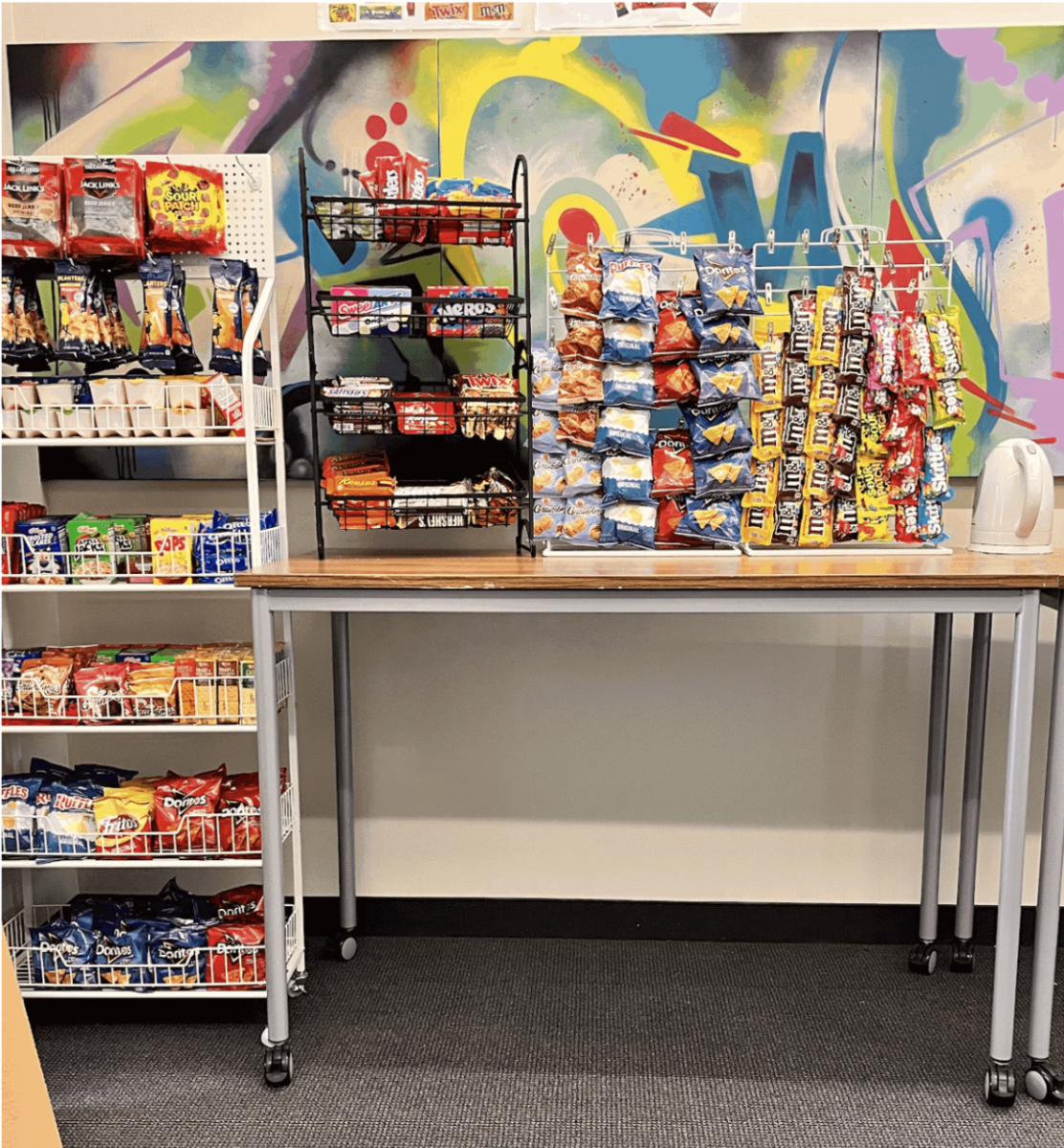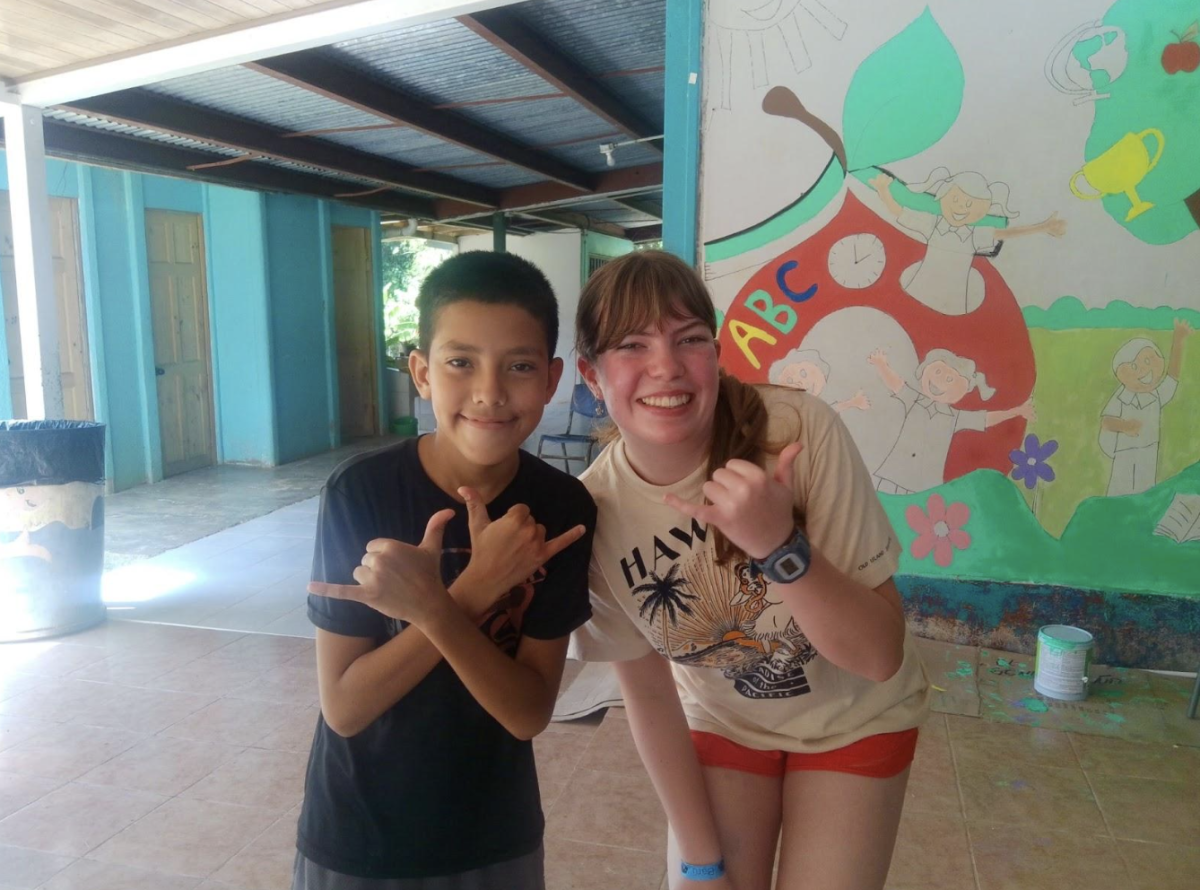 Madeleine Ainslie
Madeleine Ainslie
Design Editor
Junior Paloma Palmer packs her iPad, French textbook, uniform and sailing equipment every Sunday night before going from her mom’s house to her dad’s. Her parents’ divorce causes Palmer to shuffle across the city weekly, packing much of her life for the next seven days into a duffel bag.
“I basically live out of a suitcase or I only pack my uniform,” Palmer said. “A lot of the times I’ll forget something and it can be really stressful.”
Organization is a big part of living in two different houses with parents who share custody, especially during the school year, according to Palmer.
Palmer, whose parents divorced when she was two, says the experiences at her two homes couldn’t be more different.
“There has never been a universal set of rules for me,” Palmer said. “At my mom’s house I don’t have a curfew and I’m much more independent. At my dad’s house I do, so it’s really hard for me to adjust.”
The differences in the two households go beyond just rules.
“When I go to my dad’s house, I have an 11-year-old stepsister,” Palmer said. “There I have to communicate a lot more because my mom is always traveling, but at my dad’s it’s much more family oriented. I also have to be thoughtful of my little sister. It’s taught me to be more aware of other people’s feelings and how my actions affect others, especially because I want to be a good example for my sister.”
Sixteen percent of all families with children live in stepfamilies according to the U.S. Census Bureau.
“My little sister was born when I was too young to recognize her as anything besides a new little sister, so adjusting to her wasn’t difficult,” junior Alex Wood, whose parents also divorced when she was two, said. “My stepsisters on my mom’s fiance’s side are much older than me so I don’t live with them.”
Teens who live with stepsiblings often experience changes in routine when new family members come into their lives — and their homes — according to Palmer.
“One of the hardest things adjusting to having a stepsister was sharing not only my space but also my family with her, so at first I kind of resented it,” Palmer said. “My grandma would call my stepsister and me ‘my two granddaughters’ and I got really protective because I had been my grandma’s only granddaughter and now I had to share her.”
Initial resentment towards stepsiblings is common, especially when sharing other family members, according to Tamara Hicks, a clinical psychologist at Potrero Hill Psychotherapy.
“A struggle can occur when the hierarchy is displaced,” said Hicks. “The system is out of whack since all the kids have been bumped from their roles in the family.”
Wood sees her father, who lives in Vancouver, about twice a month and almost every break. She faces a common struggle among children of divorce: dividing up time.
“I have to deal with making decisions about colleges and spending time with different sides of the family over breaks,” Wood said. “My parents sometimes disagree, and I can get caught in the middle — which can be difficult.”
Divorce can be arduous for children, but can it be equally challenging for a parent to witness their child go through the process with them.
“Divorce was all she ever knew,” Pamela Palmer, Paloma Palmer’s mother, said of her daughter. “Because I was sharing her from such a young age, I treasured the days I did have with her even more, and it made me more appreciative of the time we spent together.”
Sophomore Abby Dolan lives in San Francisco with her mother and spends holidays such as Christmas in Boston with her father, an arrangement that was decided upon Dolan’s parents’ divorce when she was eight.
“I used to spend Thanksgiving in Boston with all my extended family, and it’s hard not doing that anymore,” Dolan said. “I hate that I don’t get to see my family on those holidays when most people spend time with all of theirs.”
Despite the stereotype of wicked stepparents, Paloma Palmer says having more parental figures can have its advantages. “I can go to different parents for different problems because they all have different backgrounds,” Palmer said. “I’m constantly receiving tons of valuable advice, from many different perspectives, something I wouldn’t necessarily be getting if it weren’t for my parents divorce.”
Children can have strong reactions to divorce because everything they thought they knew seems invalid, which can lead many to question their parent’s love for them according to Hicks.
“Younger children have a more challenging time understanding the concept of divorce, especially the permanence of divorce,” Hicks said. Teens tend to have an easier time because teens are less dependent on their parents than they are when they are younger, according to Hicks.
“I was in the first grade when my parents separated,” junior Zoe Baker said. “At first I felt isolated and embarrassed, but by the fourth grade I had come to terms with it.”
Divorce takes time to adjust to because it changes so many aspects of a child or teen’s life, according to Hicks.
“Children will hold on to fantasies that their parents will get back together even if they are miserable since this is the only concrete concept they really understand,” Hicks said.
It’s not uncommon for children to disapprove of parents’ new relationships.
“I originally didn’t react very well to my parents dating new people,” Palmer said. “I resented my stepdad for the majority of our relationship which I now regret a lot. I had to go to therapy sessions about it because I thought he was stealing my mom away from my dad, even though my parents had been divorced since I was two.”
Eleven years later, when Palmer’s mom separated a second time, Palmer encountered similar problems with the idea of a second separation.
“When my mom split up with my stepdad it was a lot harder than I expected it to be,” Palmer said. “I was really angry with her because I was like ‘Really, you’re doing this again?’ but then I realized that they hadn’t been happy for a really long time and it really benefited both of them in the long run.”
Although the initial trials and tribulations that come with adjusting to parents’ separation can be difficult, Baker says that the bigger struggle is in the little things.
“The day-to-day things are probably the hardest thing,” Baker said. “I live with my mom and I think that my dad feels sort of left out. Going back and forth was pretty difficult.”
The U.S. Census Bureau reports that 82.2 percent of custodial parents are mothers while 17.8 percent are fathers.
“Many of her peers had parents who were together so I think she felt like she couldn’t relate,” Palmer said of her daughter. “It became easier for her as she got more life experience and realized she wasn’t the only one from that situation.”
Divorce can paradoxically bring parents and children closer together through the change in their relationship, according to Baker.
“I think overall it forced me to actually become closer to my dad,” Baker said. “At the time I wasn’t really that close to him, but now we are. I think our relationship actually got stronger with the divorce.”














